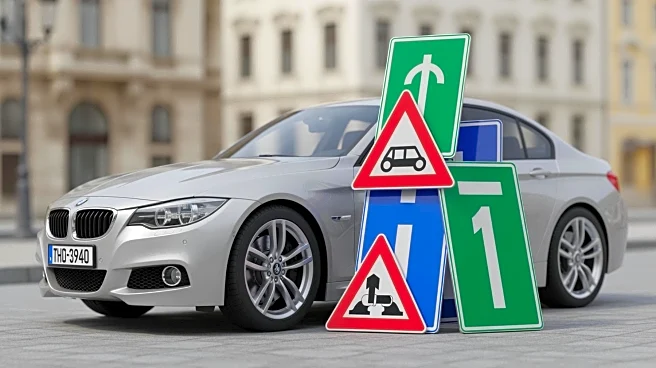What's Happening?
European cities and civil society groups have expressed concerns over the EU's intention to accept lower US car standards, warning of increased risks to road safety and public health. The trade deal between
the EU and the US proposes mutual recognition of vehicle standards, which could undermine the EU's leadership in road safety and environmental policies. European vehicle regulations have contributed to a significant reduction in road deaths, while US road fatalities have increased. The acceptance of US standards could lead to more dangerous vehicles entering the European market, affecting air quality and health. The move also poses a threat to European jobs, as production may shift to US plants.
Why It's Important?
The potential acceptance of lower US car standards by the EU has significant implications for road safety, public health, and the automotive industry. European cities and civil society groups warn that aligning with US standards could reverse decades of progress in reducing road fatalities and improving air quality. The move may also impact the competitiveness of European automakers, as production could shift to US plants, leading to job losses in the EU. The situation highlights the importance of maintaining stringent safety and environmental regulations to protect citizens and preserve the EU's global leadership in these areas.
What's Next?
EU lawmakers are urged to oppose the intention to accept lower US vehicle standards and affirm the non-negotiable nature of EU regulations. The European Commission is working to tighten import loopholes that allow oversized US vehicles to enter the market without complying with EU standards. The ongoing debate may lead to further discussions and negotiations between the EU and the US, as stakeholders seek to balance trade relations with safety and environmental concerns. The outcome of these discussions could influence future trade agreements and regulatory policies.
Beyond the Headlines
The debate over vehicle standards reflects broader issues of trade, safety, and environmental policy. The potential acceptance of US standards raises questions about the EU's commitment to maintaining high safety and environmental standards, as well as its ability to influence global policies. The situation underscores the challenges of balancing economic interests with public health and safety, prompting discussions on the ethical and strategic implications of trade agreements. As the EU navigates these challenges, the focus on vehicle standards may lead to long-term shifts in regulatory practices and international relations.









